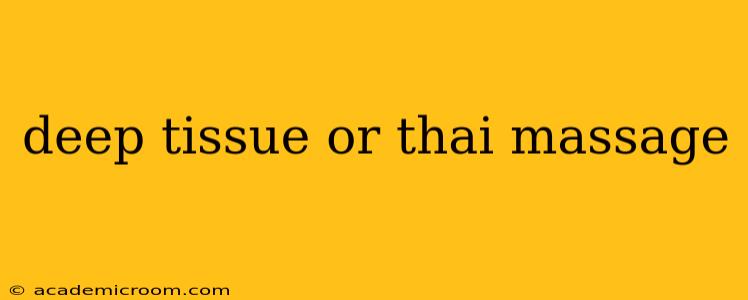Deep Tissue vs. Thai Massage: Which Massage Is Right for You?
Choosing between a deep tissue massage and a Thai massage can feel overwhelming. Both offer therapeutic benefits, but their approaches and effects differ significantly. This guide will delve into the nuances of each, helping you decide which suits your needs best. We'll explore the techniques, benefits, and considerations for each type of massage, answering common questions along the way.
What is Deep Tissue Massage?
Deep tissue massage targets the deeper layers of muscle and fascia (the connective tissue surrounding muscles). It uses slow, firm strokes and deep pressure to release chronic muscle tension, break down scar tissue, and alleviate pain. This type of massage is particularly beneficial for individuals experiencing persistent muscle stiffness, pain from injuries, or postural problems. Think knots in your shoulders, lower back pain, or persistent tension headaches – deep tissue massage might be the answer.
What is Thai Massage?
Thai massage, also known as Thai yoga massage, is a unique ancient healing art. Unlike deep tissue massage which primarily focuses on manipulating muscles, Thai massage involves a combination of assisted stretching, acupressure, and gentle rocking to improve flexibility, increase circulation, and promote relaxation. It's performed on a mat on the floor, with the recipient typically wearing loose clothing. The practitioner uses their hands, elbows, knees, and feet to apply pressure to energy lines (Sen lines) throughout the body.
What are the benefits of deep tissue massage?
Deep tissue massage offers several key benefits:
- Pain relief: Effectively addresses chronic muscle pain and tension.
- Improved range of motion: Releases tightness, improving flexibility and mobility.
- Reduced stress and anxiety: Promotes relaxation and reduces the body's stress response.
- Improved posture: Addresses muscle imbalances contributing to poor posture.
- Increased circulation: Enhances blood flow to the affected areas.
What are the benefits of Thai massage?
Thai massage boasts a unique set of benefits, including:
- Increased flexibility and range of motion: The assisted stretches lengthen and loosen muscles.
- Improved circulation and lymphatic drainage: Helps remove toxins and reduces inflammation.
- Stress reduction and relaxation: The rhythmic movements and gentle pressure promote deep relaxation.
- Improved energy flow: By working along energy lines, it aims to restore balance and vitality.
- Enhanced body awareness: Increases your understanding of your body's physical sensations and limitations.
Which massage is better for chronic pain?
Both deep tissue and Thai massage can be beneficial for chronic pain, but their approaches differ. Deep tissue massage is ideal for addressing localized muscle tension and pain, while Thai massage may be more effective in managing widespread pain and stiffness related to postural issues or overall body tension. The best choice often depends on the specific location and nature of the pain.
Is deep tissue massage painful?
Deep tissue massage can be intense and may cause some discomfort, especially during the initial session. However, a skilled therapist will adjust the pressure according to your comfort level. The goal is to release tension, not cause pain. Communicating with your therapist about the pressure is crucial.
Is Thai massage painful?
Thai massage is generally not painful. While some stretches may feel intense, they are typically not meant to cause discomfort. The practitioner should always work within your comfort zone, and you should be able to communicate any discomfort. The focus is on gentle but firm pressure and assisted stretches.
Which massage is better for relaxation?
Both massage types offer relaxation benefits, but they achieve it in different ways. Deep tissue massage provides a deep sense of relaxation by releasing muscle tension, while Thai massage uses a more flowing and meditative approach to promote relaxation and mental clarity. Personal preference plays a significant role here.
Deep tissue massage vs. Thai massage: which one should I choose?
The best massage for you depends entirely on your individual needs and preferences. Consider the following:
- Type of pain or discomfort: Localized muscle tension often responds well to deep tissue, while widespread stiffness might benefit from Thai massage.
- Level of flexibility: Thai massage is a more active style, requiring a degree of flexibility.
- Personal preference: Do you prefer deep, focused pressure, or a more flowing, meditative approach?
It's always best to consult with a qualified massage therapist to discuss your specific needs and determine which type of massage is most appropriate for you. They can assess your condition and tailor a treatment plan to achieve optimal results.
